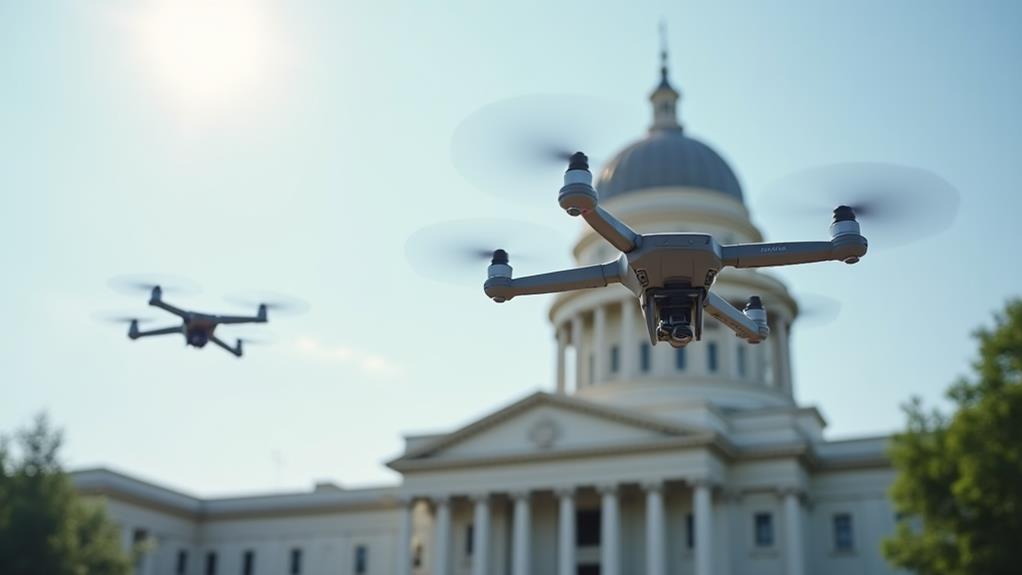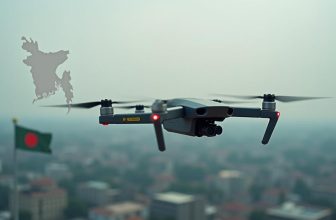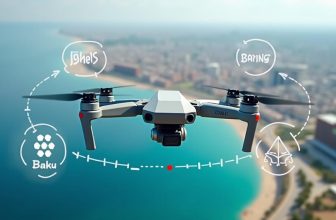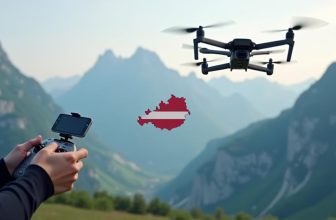
You're probably aware that North Carolina has laws in place to regulate drone use, but do you know the specifics? If you're a drone enthusiast or planning to use drones for commercial purposes, understanding these laws is vital to avoid fines and penalties. The state has rules for recreational and commercial drone use, including registration requirements, no-fly zones, and pilot certification. But what exactly does this mean for you and your drone operations? Let's break down the key regulations and explore how they impact your ability to safely and responsibly fly your drone in North Carolina.
Contents
- 1 Key Takeaways
- 2 Recreational Drone Use Rules
- 3 Commercial Drone Operations
- 4 Drone Registration Requirements
- 5 No Fly Zones in NC
- 6 Altitude and Airspace Rules
- 7 Right to Privacy Laws
- 8 Drone Pilot Certification
- 9 Safety Regulations and Guidelines
- 10 Law Enforcement Drone Use
- 11 Penalties for Non-Compliance
- 12 Frequently Asked Questions
- 13 Conclusion
Key Takeaways
- Register drones weighing over 0.55 pounds with the FAA, regardless of the state, including North Carolina.
- In North Carolina, drone pilots must maintain a visual line of sight and fly below 400 feet.
- No-fly zones in North Carolina include Fort Bragg, Marine Corps Base Camp Lejeune, and Great Smoky Mountains National Park.
- Commercial drone operators in North Carolina must obtain a Remote Pilot Certificate and secure liability insurance.
- North Carolina drone pilots must respect individual privacy by obtaining permission before flying over private property.
Recreational Drone Use Rules
When flying a drone for recreational purposes, how do you know you're complying with the rules.
In North Carolina, you must follow the Federal Aviation Administration's (FAA) guidelines for recreational drone use.
First, guarantee your drone weighs less than 55 pounds and is registered if it weighs more than 0.55 pounds.
You must also maintain a visual line of sight with your drone and keep it below 400 feet.
For Drone Safety and good Flight Practices, never fly near airports or in restricted airspace.
Additionally, respect people's privacy and avoid flying over private property without permission.
Always yield to manned aircraft and be aware of your surroundings to avoid collisions.
In North Carolina, you're also required to follow state-specific laws, such as not flying over prisons or jails.
Familiarize yourself with local ordinances and respect any restrictions that may be in place.
By following these rules, you can enjoy flying your drone while guaranteeing the safety of yourself and others.
Always check for updates on drone laws and regulations to confirm you're in compliance.
Commercial Drone Operations
Operating a drone for commercial purposes in North Carolina requires you to navigate a complex set of rules and regulations.
To guarantee compliance, you must obtain a Remote Pilot Certificate with a small unmanned aircraft systems (sUAS) rating. This certification is mandatory for drone operators who plan to engage in commercial operations, such as aerial photography, surveying, or inspection.
You must also secure liability insurance, commonly referred to as Drone Insurance, to protect yourself and your business in case of accidents or damages.
Additionally, you may need to obtain Commercial Waivers, also known as Part 107 waivers, which allow you to operate your drone beyond the standard rules, such as flying at night or beyond visual line of sight.
Some common commercial drone operations in North Carolina include:
- *Aerial photography and videography for real estate, film, and construction projects*
- *Infrastructure inspection, such as bridge and pipeline inspections*
- *Surveying and mapping for environmental and agricultural applications*
It is essential to understand the specific regulations and requirements for your commercial drone operation to avoid fines and guarantee safe operations.
Drone Registration Requirements
As you prepare to take to the skies with your drone in North Carolina, you'll need to verify you've met the drone registration requirements set forth by the Federal Aviation Administration (FAA).
If your drone weighs more than 0.55 pounds and less than 55 pounds, you're required to register it. You'll need to create an account on the FAA's website and provide your name, email address, and physical address.
The registration fee is $5, and it's valid for three years. You'll receive a unique registration number that must be marked on your drone.
Drone exemptions apply to drones that weigh less than 0.55 pounds or are used exclusively for recreational or hobby purposes. However, even if you're exempt from registration, you're still required to follow FAA regulations and guidelines.
You'll also need to provide proof of registration when requested by law enforcement. Failure to register your drone can result in civil penalties and fines.
Make sure you understand the registration requirements and exemptions to guarantee you're flying safely and responsibly in North Carolina.
No Fly Zones in NC
North Carolina has several designated no-fly zones that you must be aware of before flying your drone.
These areas are restricted due to safety, security, or environmental concerns. Understanding and respecting these no-fly zones is vital to avoid any potential risks or penalties.
Some of the no-fly zones in North Carolina include:
- National Parks: Great Smoky Mountains National Park and other national parks in the state have restricted airspace. You'll need to obtain a permit or follow specific guidelines before flying your drone in these areas.
- Military Bases: Military bases such as Fort Bragg and Marine Corps Base Camp Lejeune have restricted airspace due to security concerns. You should avoid flying your drone near these areas to prevent any potential security risks.
- Prisons and Correctional Facilities: State and federal prisons in North Carolina are also no-fly zones due to security concerns. You should be aware of the locations of these facilities to avoid flying your drone in restricted airspace.
Familiarizing yourself with these no-fly zones will help you plan your flights safely and responsibly.
Always check for updates and follow any specific guidelines or regulations before flying your drone in North Carolina.
Altitude and Airspace Rules
Most drone flights in North Carolina are restricted to a maximum altitude of 400 feet above ground level. As a drone operator, you must adhere to this altitude limit to avoid potential conflicts with air traffic.
The Federal Aviation Administration (FAA) regulates airspace in North Carolina, and drone flights are subject to specific flight restrictions.
When flying your drone, you're required to maintain a safe distance from manned aircraft and heliports.
You must also be aware of temporary flight restrictions (TFRs) that can be implemented due to special events or natural disasters. These restrictions can substantially impact air traffic and may require you to adjust your flight plan accordingly.
Additionally, you're responsible for ensuring that your drone doesn't pose a hazard to air traffic.
You must yield to manned aircraft and avoid flying in areas with high air traffic volumes.
Right to Privacy Laws
How do you balance the benefits of drone technology with the need to protect individual privacy? This is a critical question in North Carolina, where drone laws aim to safeguard private property and prevent unwarranted aerial surveillance.
As a drone operator, you must be aware of the state's right to privacy laws, which regulate the use of drones in various settings.
To illustrate the importance of respecting individual privacy, consider the following scenarios:
- Residential areas: Flying a drone over private homes without permission can be seen as an invasion of privacy.
- Private events: Using a drone to capture footage of private events, such as weddings or parties, without consent can be considered a breach of privacy.
- Commercial properties: Conducting aerial surveillance of private businesses without permission can lead to legal issues.
In North Carolina, it's essential to obtain explicit permission from property owners or individuals before flying a drone over private property.
Failure to do so can result in civil liability and potential lawsuits.
Drone Pilot Certification
If you're interested in operating a drone for commercial or recreational purposes, you'll need to understand the certification requirements.
You'll have to meet specific age and eligibility criteria set by the Federal Aviation Administration (FAA) or your country's equivalent regulatory body.
These requirements typically include passing a knowledge test, being at least 16 years old, and being able to read, speak, write, and understand English.
Certification Requirements
To operate a drone for commercial or recreational purposes, you must comply with the Federal Aviation Administration's (FAA) certification requirements, also known as the drone pilot certification program.
This program is designed to guarantee that drone pilots have the necessary knowledge and skills to operate drones safely and responsibly.
To become certified, you must pass a knowledge test administered by the FAA.
The test covers topics such as airspace, weather, aircraft performance, and regulations.
To prepare for the test, you can study the FAA's study guide, take online courses, or attend a training program.
Some key aspects of the certification requirements include:
- *Understanding of airspace classifications*, including Class G, E, D, C, B, and A airspace, and the restrictions that apply to drones in each class.
- *Knowledge of weather conditions*, including understanding weather forecasts, warnings, and advisories, and how to interpret weather data.
- *Familiarity with drone insurance and pilot liability*, including understanding the importance of insurance coverage and the potential consequences of pilot error or negligence.
Age and Eligibility
At least 16 years old is the minimum age requirement to apply for the drone pilot certification program.
If you're between 16 and 18 years old, you can still become a certified drone pilot, but you must obtain parental consent. As a minor operator, you're required to have a parent or guardian sign a consent form before submitting your application.
This verifies that your parent or guardian is aware of the regulations and requirements associated with drone operation.
As a minor, you'll also need to complete the required training and pass the knowledge test to become certified.
There are no restrictions on the type of drone operations you can perform as a minor, but you must comply with all applicable regulations.
You can operate drones for recreational or commercial purposes, as long as you follow the rules and guidelines set by the Federal Aviation Administration (FAA).
It's crucial to review and understand the drone laws and regulations before applying for certification to guarantee a smooth and successful process.
Safety Regulations and Guidelines
You're likely flying your drone frequently, and as a responsible operator, you want to guarantee you're following the necessary safety regulations and guidelines.
In North Carolina, the Federal Aviation Administration (FAA) regulates airspace management and requires drone operators to adhere to specific safety guidelines.
To confirm safe drone operations, consider the following:
1. Airspace Awareness: Familiarize yourself with local airspace restrictions, including no-fly zones and temporary flight restrictions (TFRs).
Utilize the FAA's B4UFLY app to plan your flights and certify compliance.
2. Emergency Response Planning: Develop a plan for responding to emergencies, such as a lost link or system failure.
Practice responding to these scenarios to minimize risks.
3. Visual Line of Sight (VLOS) Maintenance: Always maintain a visual line of sight with your drone to prevent accidents and verify you're aware of your surroundings.
Law Enforcement Drone Use
When you look at law enforcement drone use, North Carolina stands out as a state that has made significant strides in implementing drone policing.
You'll find that NC drone regulations play a pivotal role in governing how law enforcement agencies use drones for various purposes, including surveillance, search and rescue, and evidence collection.
As you explore the topic further, you'll see that law enforcement training is also essential for effective and responsible drone use by law enforcement agencies.
Drone Policing in NC
Law enforcement agencies in North Carolina have been increasingly adopting drones as a valuable tool in their policing efforts.
You may be wondering how these drones are being used to enhance public safety. Drone policing in NC is a multifaceted approach that incorporates various strategies, including drone surveillance.
This technology allows law enforcement to gather critical information about a situation before sending in personnel, reducing the risk of injury or harm.
Some ways drones are used in policing efforts in NC include:
- *Monitoring crowds and large events*: Drones equipped with high-resolution cameras can monitor crowds, helping law enforcement identify potential threats and respond quickly.
- *Searching for missing persons*: Drones equipped with thermal imaging cameras can search for missing people in remote or hard-to-reach areas.
- *Investigating crime scenes*: Drones can capture detailed images of crime scenes, helping investigators reconstruct events and gather evidence.
Drone policing in NC aims to enhance police accountability by providing a clear and unbiased perspective of policing efforts.
NC Drone Regulations
As North Carolina law enforcement agencies increasingly adopt drones, they must operate within a framework of regulations that govern their use.
The NC legislature has established laws regarding drone use by law enforcement, emphasizing transparency, accountability, and respect for individual rights. You should be aware that these regulations dictate when and how drones can be deployed, including the requirement for obtaining warrants in certain circumstances.
Law enforcement agencies must also adhere to specific guidelines for drone deployment, such as providing notice to the public and conducting regular audits.
In addition, the NC legislature has implemented measures to address concerns raised by drone advocacy groups, including the protection of personal data and the prevention of unreasonable searches.
You'll need to stay informed about these regulations, as they're subject to change and revision.
Law Enforcement Training
Effective law enforcement drone use begins with thorough training for officers.
As you consider the role of drones in police tactics, it's vital to understand the importance of exhaustive training exercises. In North Carolina, law enforcement agencies must guarantee that drone operators receive the necessary training to safely and effectively use drones in various situations.
Key components of law enforcement drone training include:
- *Flight operations*: Training exercises focus on developing the skills needed to safely operate drones in different environments, including urban and rural areas.
- *Sensor operation and data analysis*: Officers learn how to effectively use sensors and cameras to gather and analyze critical data, such as video and photographic evidence.
- *Search and rescue procedures*: Training exercises simulate real-world scenarios, enabling officers to develop the skills needed to use drones in search and rescue operations.
Penalties for Non-Compliance
Recurring incidents of non-compliance with drone regulations have spurred authorities to implement strict penalties.
If you fail to comply with the Federal Aviation Administration (FAA) and North Carolina drone laws, you may face severe consequences. Civil fines can range from $500 to $27,500, depending on the severity of the offense.
For instance, flying a drone in restricted airspace or operating a drone without proper registration can result in significant fines.
In addition to civil fines, you may also face criminal convictions for more serious offenses.
If you're found guilty of reckless or negligent drone operation, you could face imprisonment or probation. Additionally, if you use a drone to commit a crime, such as espionage or stalking, you'll be subject to more severe penalties.
It's crucial to familiarize yourself with the drone laws in North Carolina to avoid these penalties. Make sure to register your drone, follow airspace restrictions, and operate your drone in a safe and responsible manner.
Frequently Asked Questions
Can I Fly Drones Near Prisons in North Carolina?
You can't fly drones near prisons in North Carolina, as this poses a significant threat to prison security and potentially undermines aerial surveillance efforts, according to the NC Department of Correction and FAA guidelines.
Are Drone Insurance Policies Required in NC?
You're the guardian of your drone, protecting it from unforeseen storms. When it comes to drone insurance policies, you're not required to have one in North Carolina, but it covers drone risks, helping with insurance claims.
Can I Fly Drones Over Private Property in NC?
When flying drones, you must respect air rights and property boundaries. You're generally allowed to fly over private property, but you'll need permission if you're entering the property's airspace to collect data or images.
Do I Need Permit to Fly Drones at Night in NC?
You'll need an FAA waiver for Night Ops, and possibly airborne permits, depending on the location and intended use. In North Carolina, you must also comply with state regulations and obtain any required permits before flying drones at night.
Can Minors Operate Drones in North Carolina?
When considering youth drone operation, you should know minors can fly drones in North Carolina, but they must meet specific requirements. Many organizations offer drone education and youth programs to teach safe flying practices.
Conclusion
Navigating North Carolina's drone laws is like charting a flight plan – you must know the terrain to avoid turbulence. By registering your drone, respecting no-fly zones, and adhering to altitude and airspace rules, you'll stay on course. Whether you're a recreational or commercial operator, compliance is key to safe and responsible drone use. Familiarize yourself with these regulations to traverse a smooth flight and avoid costly penalties.






